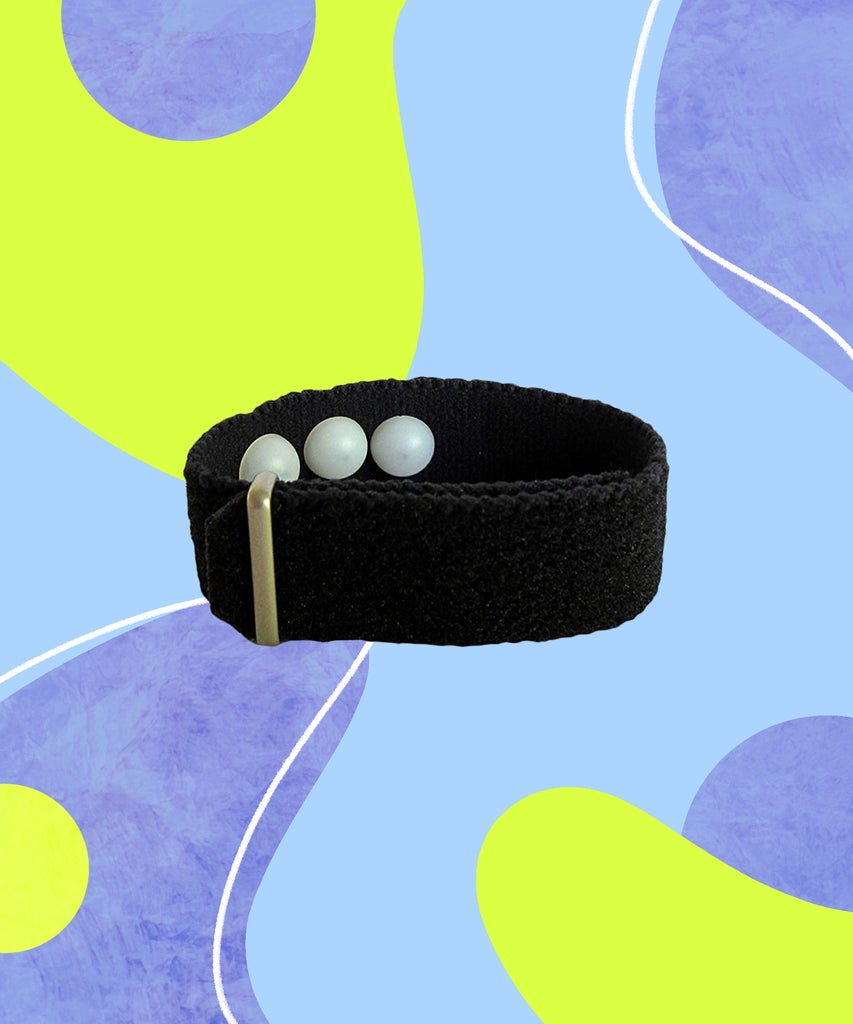
I’ll try anything to quell my stress. Nine months into 2020, many of us feel that way — likely because, given the state of the world, more people than ever are dealing with the effects of chronic tension. Young adults and Black and Latinx people of all ages have reported an uptick in anxiety and depression during the pandemic, according to a survey by the Centers for Disease Control and Prevention. People without diagnosed mental health disorders are feeling anxious, uncomfortable, lonely, and drained too.
So when I heard about anxiety bracelets I thought, why not give it a try? Certainly, a wristband is no substitute for therapy — but like I said, I’m trying everything I can get my hands (or wrists) on to cut back on my stress levels. While I was waiting for the effects to kick in, I decided to ask a few experts what they thought about the bands. This is what I learned.
What are anxiety bracelets?
Most anxiety bracelets actually have roots in the traditional Chinese medicine technique of acupressure point therapy, says Anita Kanti, a certified life coach and the author of Behaving Bravely: How to Mindshift Life’s Challenges. The straps contain magnetic materials, crystal beads, or copper nubs that apply pressure to spots on the underside of your wrist — acupressure points that supposedly help release tension. Some more expensive versions even vibrate.
How do anxiety bracelets work?
There are a few specific acupressure points (called meridian points) that the bracelets tend to target: P6 (or pericardium 6 or Nei Guam), P7 (pericardium 7 or Da Ling), and H7 (heart 7 or Shen Men).
P6 is often used to help with motion sickness, but it works generally for nausea and upset stomachs, according to UCLA. P7 is associated with insomnia and stress, according to Smarter Healing. And H7 is thought to help with emotional struggles. They’re all located on the underside of your wrist, on or near the crease where your hand meets your arm. “Professional acupressure practitioners say stimulating these points can aid in immediate calmness,” Kanti says.
Do anxiety bracelets work?
There’s a lack of research, so it’s hard to say for sure. Kanti says the bracelets may offer a complementary coping mechanism for stress, especially when paired with other approaches. “Exploring this natural solution is a personal choice and [it] may not work for everyone,” she says. “The human mind is mighty, and what you believe can dictate your outcome, as far as the state of mind. A wearable tool may remind you to self-adjust, and that can’t hurt.”
She also says that some of her clients don’t use the bracelets for the acupuncture benefits, but as a talisman of sorts. “Wearables can carry messages, serve as reminders to be mindful, as well as be an inspiration,” she says. Wendell Miracle Pialet, a happiness counsellor, motivational speaker, and author, agrees: “It’s a physical reminder to be aware of your anxiety and stop it in its tracks before it gets worse.” (If you’re using it for this purpose, any bracelet or crystal could work.)
Others, however, don’t recommend anxiety bracelets, and say the expensive vibrating versions are a waste of money. Lissette LaRue, MS, a trauma release specialist, psychotherapist, energy medicine practitioner, and the founder of Healing From Within. “I actually have a set and, honestly, it works just okay,” she says. “For the hefty price tag, though, it’s not worth it. It’s most benefiting if you wear them all day, on both wrists, and the battery doesn’t last that long.” She prefers other techniques, like deep breathing.
One thing these bracelets can’t do is heal mental health conditions like clinical anxiety or depression, Kanti stresses. For conditions like these, see a therapist or doctor.
What to look for in an anxiety bracelet
If you want to try out an anxiety bracelet, look for one that goes into some detail about which pressure points it hits — ideally, the P6, P7, and H7, Kanti advises. Some with good reviews include the Velcro Strap Acupressure Bracelet, and the SHIWE lava bracelet.
When you put them on they shouldn’t hurt or rub your skin raw, but there should be a bit of pressure. In a world where we could all stand to see a little less stress, we hope they help you unwind. As for me, I’m picking at my nail beds slightly less often, so that’s something.
Like what you see? How about some more R29 goodness, right here?
Three Breathing Exercises To Help Calm Anxiety